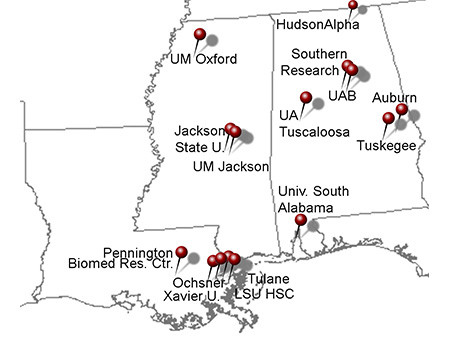
The Center for Clinical and Translational Science — an entity that has been a “driving force for scientific innovation and excellence” at the University of Alabama at Birmingham for more than 10 years — will continue its transformational bench-to-bedside work for the foreseeable future.
The CCTS has been renewed for another five years with grants from the National Center for Advancing Translational Science, part of the National Institutes of Health. The three linked grants, totaling nearly $50 million over five years, will support clinical and translational research, mentored career development, and pre-doctoral training. The CCTS is one of more than 50 programs nationally funded by the Clinical and Translational Science Award program from NCATS.
“UAB’s CCTS is translating observations in the laboratory, clinic and community into interventions that improve the health of our citizens and our society overall,” said Ray L. Watts, MD president of UAB. “We are proud of the contributions our CCTS and its Partner Network are making to bring more new treatments to more patients more quickly than ever before.”
UAB’s CCTS, established in 2008, nurtures research locally, regionally and nationally through partnerships with academic health centers, research institutes and universities. It also accelerates the process of translating laboratory discoveries into treatments for patients, facilitates training of the next generation of clinical and translational researchers, and engages communities in clinical research efforts.
 Robert Kimberly, MD, CCTS Director“As the sole Alabama-based hub in the NCATS-funded CTSA program, the CCTS has been a driving force for scientific innovation and excellence for the past decade,” said Robert Kimberly, MD, Howard Holley professor, senior associate dean for Clinical and Translational Research in the School of Medicine, and director of the CCTS. “Through its leadership, as evidenced by an astounding array of research supports and collaborations, the CCTS is transforming the biomedical research environment at UAB and beyond.”
Robert Kimberly, MD, CCTS Director“As the sole Alabama-based hub in the NCATS-funded CTSA program, the CCTS has been a driving force for scientific innovation and excellence for the past decade,” said Robert Kimberly, MD, Howard Holley professor, senior associate dean for Clinical and Translational Research in the School of Medicine, and director of the CCTS. “Through its leadership, as evidenced by an astounding array of research supports and collaborations, the CCTS is transforming the biomedical research environment at UAB and beyond.”
The CCTS has secured more than $123 million in competitive federal funding, including 14 supplemental awards, and has leveraged multiple multi-institutional grants across the network. It has granted 62 pilot awards, producing nearly 1,500 publications and an overall return on investment of 49:1 since 2008.
“NIH’s decision to continue supporting translational science efforts at UAB is a clear indication of the excellent work taking place at CCTS,” said U.S., Sen. Richard Shelby. “Advancing biomedical research to find treatments and cures for patients is of the utmost importance, and I am proud UAB is receiving additional funding to further this cause. I look forward to continuing to work with UAB, NIH, and my colleagues to improve medical services in Alabama and throughout the nation.”
 Linked Grants
Linked Grants
Kimberly is the principal investigator on the core CCTS grant, totaling more than $38 million. The additional two linked grants — $5.2 million for the Deep South Translational Research Mentored Career Development Program and $3.7 million for a National Research Service Award training core — are led by Kenneth Saag, MD, the Jane Knight Lowe professor and vice chair for Outcomes Research of the Department of Medicine.
The CCTS partner network — which comprises 11 academic and scientific research institutions in Alabama, Louisiana and Mississippi — is the foundation of the center’s regional collaborative efforts. Launched in 2015, the network shares a common purpose: to reduce the burden of cardiometabolic, vascular and cancer-related diseases and health disparities that disproportionately affect the underserved minority and special populations in the Deep South.
“The vision of the CCTS is to reduce health disparities in diseases disproportionately represented within the Deep South as we accelerate discovery to improve human health,” Kimberly said. “Our partner network works to ensure that our research and training efforts serve the special populations in our region while maximizing collaborative synergies in translational research to advance fundamental and clinical discovery through to application to human health and health care delivery.”
Driven by this mission and building on existing achievements and progress, the CCTS partner network has organized an ambitious set of initiatives for the next five years.
The center is developing a diverse, skilled translational workforce and engaging communities in trusting, productive relationships and broadly engaged teams that advance knowledge. It is advancing collaborative, coordinated data analytics and informatics, and promoting methodologically rigorous science enabled through valuable partnerships that address health issues of particular significance to the region. Through these coordinated efforts, Kimberly says, the CCTS partner network will accelerate clinical and translational research in the Deep South and reduce the burden of the significant health disparities faced by our populations.
Translational Thinkers
To prepare researchers for the collaborative projects needed to address the most complex health challenges, the CCTS Training Academy, under the leadership of Michael J. Mugavero, MD, professor of medicine, and David D. Chaplin, MD, Ph.D., professor of microbiology, offers learning opportunities that create “translational thinkers” who are multilingual — that is, they are familiar with the basic principles and terminologies of key fields in translation, from informatics, biostatistics and study design to team science, ethics and community engagement. The CCTS Clinical and Translational Science Training Program, a six-month experience that has introduced hundreds of investigators at all career stages to the language of translation, graduated nearly 50 trainees in 2018.
At the national level, CCTS is leading nine CTSA program hubs charged by NCATS to develop a translational version of the National Science Foundation’s I-Corps program. Unveiled in 2018, the I-Corps@NCATS program prepares biomedical scientists to think like entrepreneurs, ensuring their projects meet real-world health needs by connecting them to the potential customers of their research.
This article was originally posted on www.uab.edu/news.